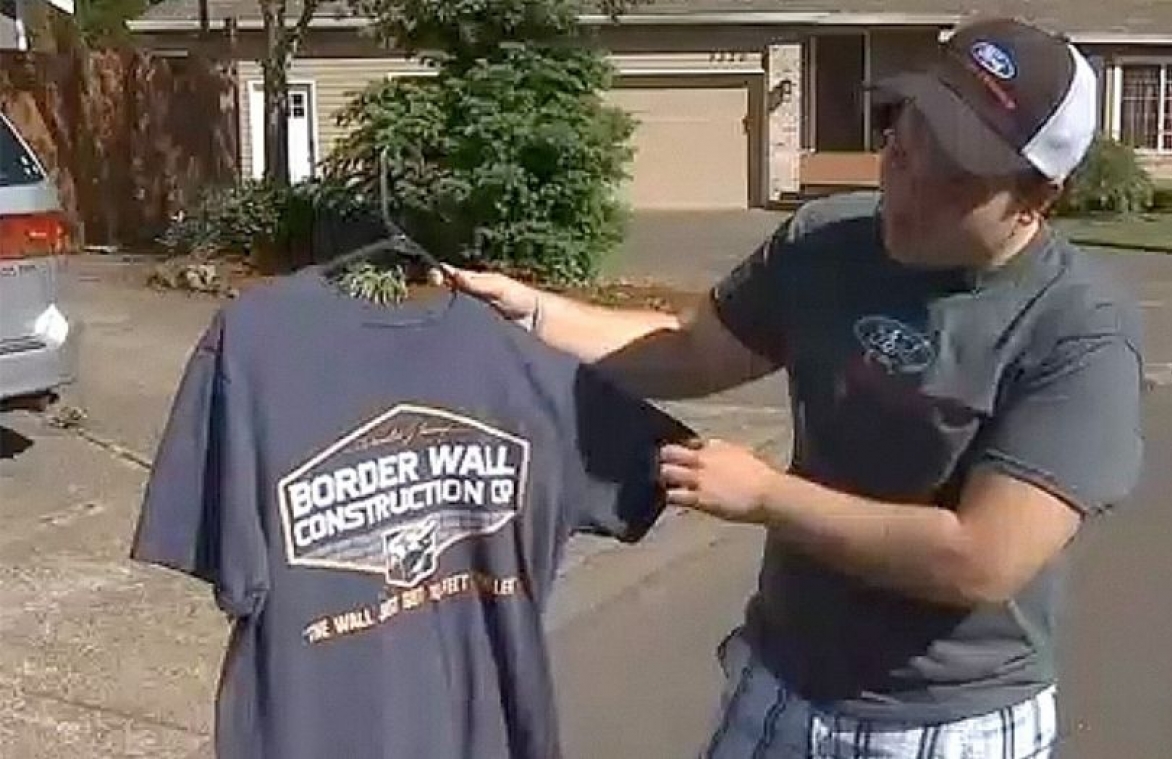An Oregon high school student has sued his school district for sending him home for wearing a t-shirt bearing the words “Donald J. Trump Border Wall Construction Co.” and “The Wall Just Got 10 Feet Taller.”
The lawsuit raises interesting questions under the leading U.S. Supreme Court standard for student speech.
The controversy began when Addison Barnes, a senior at Liberty High School in Hillsboro, Oregon, wore the t-shirt in January 2018 to his “People and Politics” class. The scheduled topic of the class that day was immigration. An assistant principal removed Barnes from the classroom and ordered him to cover up the shirt because another student was offended.
Barnes initially covered up the shirt but then uncovered it, believing he had a First Amendment right to display the t-shirt. The assistant principal then gave Barnes the option to remove the shirt or go home. Barnes went home.
Last month, Barnes filed a lawsuit in federal court. The lawsuit alleges that school officials violated his First Amendment free-speech rights by engaging in viewpoint discrimination. The lawsuit alleges that one of Barnes’ teachers displayed a sign in the classroom stating “Sanctuary City, Welcome Home.”
Public school students do not forfeit or “shed” their free-speech rights at school. The U.S. Supreme Court established this in its famous decision Tinker v. Des Moines Independent Community School District (1969). In Tinker, the Court ruled that public school officials in Des Moines, Iowa, violated the free-speech rights of several students by suspending them for wearing black peace armbands to protest the Vietnam War.
The Court ruled that school officials could prohibit student speech only if it caused a substantial disruption or material interference with school activities or invaded the rights of others. Barnes contends that – like the black armbands in Tinker – his t-shirt was a form of passive political speech that did not cause any substantial disruptions.
If Trump t-shirts had not caused fights in schools or major disturbances, Barnes likely has a good point. The Tinker substantial disruption test is often regarded under the rubric of what is known as a reasonable forecast. In other words, the question becomes whether school officials can reasonably forecast that the t-shirt will cause a substantial disruption of school activities.
The t-shirt clearly constitutes political speech on an important matter of public concern – immigration. However, in some recent decisions, courts have watered down the substantial disruption test. For example, in Dariano v. Morgan Hills Unified School District (9th Cir. 2014), the 9th Circuit ruled that school officials could prohibit students from wearing t-shirts bearing the image of the American flag on Cinco de Mayo, because there had been racial tension previously at the school. Dariano was an unfortunate decision that shows a phenomenon I have referred to as “losing the spirit” of Tinker.
There is another aspect of the Tinker test, sometimes referred to as the “invasion of the rights of others” prong. The Court in Tinker emphasized that public school students do not have the right to engage in speech that invades or impinges on the rights of others students. The question becomes whether Barnes’ shirt could fall under this test. School officials apparently claimed that a couple other students were offended by the students.
However, student speech does not lose its protection merely because it offends someone. The black armbands in the Tinker case, for example, likely offended some students with strong pro-war viewpoints. To invade the rights of others, the speech must cause serious damage and probably rise to the level of tortious conduct.
It appears that school officials censored Barnes’ t-shirt because they were offended and did not like the speech. That is not acceptable under a proper understanding of the Tinker standard.
It will be interesting to see how the Barnes case develops. Anyone who cares about the state of student speech should pay attention.
David L. Hudson, Jr. is a First Amendment scholar and the author of Documents Decoded: Freedom of Speech (ABC-CLIO, 2017), Let the Students Speak!: A History of the Fight for Freedom of Expression in American Schools (Beacon Press, 2011), and First Amendment: Freedom of Speech (Thomson Reuters, 2012).

